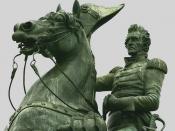In the years following Reconstruction, America changed from a country of farms into a nation of growing businesses, factories, and cities. Despite these changes, the decades of the Gilded Age earned a reputation of widespread corruption in government and business, as well as the failure of the era's Presidents to resolve the persistent economic, social, and political problems facing the nation.
The rise of industry and business defined the period. New technologies revolutionized business, and the economy became increasingly composed of managers and shareholders. The United States built up a national marketplace connected by railways in which mass marketing and national product lines developed. Business operated largely under laissez-faire, or without government control. Supporters of this theory explained that if the government does not interfere, the strongest businesses would prevail and bring wealth to the nation as a whole. To keep the laissez-faire policy active, businesses often contributed to friendly politicians, both legally and illegally with contributions of money.
The spoils system was widely used to elect government officials who were supporters of such businesses. Under the spoils system, those who were elected in public office were free to appoint friends or supporters to government jobs, regardless of their qualifications. This system led to extensive corruption among politics and business. Since the Democratic and Republican parties were so close in numbers, they needed every vote. Political party bosses such as William Marcy Tweed in New York blatantly rigged and bought elections. In the election of 1880, Republican candidate Garfield won a narrow victory and became the 20th president. Not long after, a deranged lawyer named Charles Guiteau shot him on July 2, 1881. Guiteau, who was a loyal Republican, felt his loyalty had earned him a job under the spoils system, and became enraged when Garfield passed him over. With...



America
this is a very well written essay. It clearly explains its topics and then goes into even more detail after that. This sounds like an adult wrote it though, not a 10th grader. I would use this as a reference if i was doing a report on it though!!
4 out of 4 people found this comment useful.